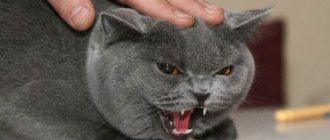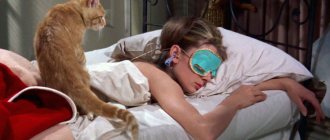Do you feel a sudden touch on your face or wake up ten minutes before your alarm goes off? If it's your favorite furry friend who wakes you up every morning and doesn't give you as much rest as you want, you may be asking yourself why this might be, whether you should be concerned or not, and how you can change this behavior.
If you're wondering: why does a cat wake you up in the morning? First of all, you should know that all cats are crepuscular creatures, which means that they are most active during sunset and sunrise. This is why your cat may wake you up, although we'd like to delve deeper into this topic so you know how you can resolve this situation if it becomes more serious.
The cat wakes me up every morning
As we mentioned above, cats are not nocturnal, as you might think. Cats are actually crepuscular, meaning that they are awake and more alive at dusk and dawn. Why? Their ancestors, African wild cats, hunted prey such as rats and mice in the wild, so this instinct has been prevalent for many years.
© shutterstock
This is when your cat will be most active, but how do they know what time it is? It's simple: sunlight. This is the most obvious sign that it's time to wake up, so your cat may wake you up earlier than usual in the summer because the sun rises earlier than in the winter.
However, you may still want to ask yourself what your cat wants. There are a few main reasons why you need to check to solve this problem and make sure you get a good night's sleep. Pay attention to the following symptoms to determine why your cat is waking you up in the morning.
Hanging blackout curtains
How to stop a cat from getting up early? Create an artificial night! The first rays of the sun are a signal about the coming of a new day, which the pet perceives in the same way as we do. He may wake up with them and want to have breakfast or play.
To prevent this from happening, you can hang special blackout curtains and close them at night. And then, with the onset of early morning, the pet will think that it is still night and it is not time to get up yet.
Blackout curtains will help create an artificial night so that the cat doesn’t bother you Up We organize evening games
To prevent the cat from disturbing you in the morning, you can keep him busy with active games the night before. The more effort you put in, the better the effect will be.
hunting are best suited . After all, it is after this that cats usually go to sleep.
Up We provide entertainment for the mustachioed
How to wean your cat from waking up early in the morning? Provide toys, and then instead of waking you up, she will have more interesting things to do. Just keep in mind: toys should not create loud sounds, otherwise the effect will be the same.
A good option is interactive games with food . They will solve two problems at once: they will be excellent entertainment, and at the same time they will help you get food on your own in the morning, and then the need to wake you up will disappear by itself.
Toys with food are great entertainment for cats Up
The cat wakes me up with a loud meow
Does your cat wake you up by meowing? Does he or she start with a faint sound that gets stronger the longer you ignore them? There may be several reasons for this behavior. Let's look at the option
The cat warns you about illness
While this is a rare reason for your cat to wake you up in the morning, it is important to rule out this option for your cat's health. You've probably noticed that your cat wakes you up by meowing because she's sick because she's never behaved this way before. If you suspect your cat is sick or has not been to the vet in the last 6 to 12 months, take her to the vet as soon as possible. If your cat is approaching old age, look out for the following signs:
- Arthritis : You will also notice a decrease in your cat's activity, they will also meow if you lift them in certain positions, their joints will swell, become less flexible, and you will notice changes in their toilet habits.
- Hyperthyroidism : This condition usually appears in cats 12 years of age and older. There are no clear symptoms, and diagnosis must be carried out by a veterinarian, who will conduct a blood test, as well as palpation of the thyroid gland.
- High blood pressure : You will also notice blood in the urine, bleeding in the eyes, dilated pupils, blindness, seizures, nosebleeds, and weakness in the side or legs.
If you notice any symptoms or suspect that this may be a problem, be sure to take your cat to the vet so it can be properly diagnosed.
Your cat is hungry
We already know that cats are creatures of habit. Therefore, if you feed your cat long before bedtime, she will usually demand food earlier. Moreover, if you feed your cat early in the morning on weekdays, she will still demand food at the time you usually feed her.
Your cat is looking for attention
If you are in the habit of always paying attention to your cat's meow, whether through feeding or petting, you will quickly associate this positive reinforcement with the action of the meow. If you are away from home during the day, he will likely be sleepy out of boredom, so he will seek your cuddles and attention through meows, and the morning is one of those times when they are in their most active mood. This is also one of the main reasons why your cat meows so much not only in the morning.
Reasons why a cat is awake at night
The pet's activity manifests itself closer to night because it is a predator, albeit a domestic one. His wild ancestors hunted at night. He continued this habit.
Other explanations for nocturnal activity include:
- Demand for food because the owner did not feed the ward enough in the evening. He meows from hunger, trying to get him to give him food.
- Need for communication. He was alone in the house or apartment all day while people were working, and hopes to get attention from them, at least at night.
- Health problems that bother your pet, forcing you to meow.
- The ward slept during the day when no one disturbed him.
The cat wakes me up by purring
The reason why your cat purrs to wake you up in the morning is simpler. As we said, your cat is more active during sunrise, so she will crave some attention and cuddles during this time and will go back to sleep to complete her 16-hour nap.
Why do cats purr? It is their way of expressing affection or pleasure, and they usually purr only to members of their own family. It also helps relieve stress. If your cat purrs, this is a very good sign; she probably loves you and feels safe around you.
Moreover, your cat can actually predict when you will wake up. As you may know, humans have up to five stages of sleep, during which several body functions change. By your breathing and heart rate, your cat will know when you are about to wake up and will be there to greet you with purrs and affection.
© shutterstock
Why does the cat scream? Possible reasons and ways to calm your pet
Does your pet scream just as loud? Then this article is for you.
Most cat owners expect only pleasant moments from communicating with their pet. It's always a joy to pick up, stroke, caress a soft fluffy little ball, and listen to it purr. However, sometimes a pet shows character, expresses its emotions and becomes not so sweet and cute.
With a loud cry, a cat signals us about its problems and desires. Many pets do not want to silently experience stress, resentment, pain, but certainly try to notify the whole world about them and, first of all, their owners. Remember, every “cat concert” has a reason, sometimes we just can’t figure out what it is.
In this publication, we will help you figure out why a cat screams loudly and how to help your pet in a given situation.
Loud cat cries often indicate that your pet is in pain. Perhaps the animal has an injury or is experiencing acute pain in the gastrointestinal tract.
To determine the cause of your pet's anxiety, gently feel it and make sure that touching different parts of its body does not cause discomfort.
Otherwise, you should immediately show the cat to a veterinarian.
When a pet walks and screams for no apparent reason, it is most likely just attracting attention. Cats understand well that the owner will react to their cry. Often in this way they beg for a treat or food when they are hungry, and when they are not hungry either.
Most pets spend the entire day alone and lack affection and attention. With a cry, the cat asks to be played with, stroked, and given time.
Calm the cat down, play with it, talk to it, give it something tasty, let the pet feel your love and care. Spend more time with your cat, buy new toys more often. Perhaps then the pet will forget that you need to wake you up at night with its loud screams.
Pet is stressed
Cats don't like changes in their lives. Moving to another place of residence, the loss of a person or another pet, or the appearance of a new family member leads to the fact that the cat begins to worry and show its displeasure by screaming.
In such a situation, spend more time with your pet, do not leave him alone for a long time. If the situation worsens, show the animal to a veterinarian, he will prescribe drug therapy.
Raging sex hormones are one of the most common causes of “cat concerts.” During this period, cats and kittens crave “love.”
Unmet needs cause animals psychological and physical discomfort. In pets living at home, sexual activity can occur at any time.
Cats are able to go for walks up to 10 times a year, and males can be constantly sexually aroused if they sense the female’s pheromones.
However, sexual heat in cats intensifies closer to spring. Already in February, pets begin to demand procreation: scream heart-rendingly, mark the apartment, and run away into the street.
During sexual heat, cats emit loud cries that can be heard 2-3 km away. In this way, pets attract potential partners for mating, telling them: “I’m here, find me quickly!”
At the same time, the owners of screaming cats are in a panic trying to decide how to calm the animal: satisfy the natural needs of the pet, resort to surgery, or use a humane method of contraception with the help of special drugs to regulate sexual heat.
Let's take a closer look at each of these methods.
Helping your pet satisfy the call of nature is the most natural way out of a situation when a cat screams. However, this is only at first glance.
If a cat does not represent a breed value, unwanted kittens will be born, which will be difficult to place in good hands. Thus, having temporarily solved the problem of your pet’s sexual desire, you get another problem related to the fact that there are often not enough good hands for everyone.
Surgery is another way to get rid of a cat’s crying due to sexual heat. Sterilization and castration are surgical operations to remove the genital organs of cats.
In cats, the ovaries and uterus are removed during surgery. The testes and part of the spermatic cord are removed from cats. In order to carry out sterilization or castration, the animal is temporarily euthanized and the pet is under general anesthesia.
Preparation for the operation begins with choosing a veterinary clinic in which it should be performed. It is better if it is a large clinic that has proven itself well.
Before surgery, in some cases, an ultrasound of the heart is performed. The cardiologist must make sure that the pet’s cardiovascular system is healthy and that it can tolerate anesthesia. If necessary, the therapist takes a general and biochemical blood test, does a urine test and a smear for hidden sexually transmitted infections. After this, the cat is sent to the surgeon.
Since sterilization is performed under general anesthesia, preparation must begin in advance. One of the doctors' requirements is a mandatory starvation diet. The pet should not be fed for 8-12 hours and given water 3 hours before surgery. An animal that is left without food is stressed and will constantly ask to be fed. However, you cannot give him food.
The amount will be different in different regions. On average, preparatory tests will cost the animal owner from 1000 to 2000 rubles. In addition, sterilizing a cat will cost you 5,000 rubles, if you castrate a cat, the price will be about 3,000 rubles.
So, it is already clear that castration or sterilization is not a simple operation. When we take a pet into our home, we take on a huge responsibility. So what can happen after the operation, what consequences can the owner expect?
Consequences of the operation
If the operation was performed poorly, an infection was introduced during it, cats may experience bleeding, prolapse or inflammation of the stump of the spermatic cord, abscess, peritonitis and sepsis, and infectious diseases may develop.
In cats, a poorly performed operation may cause peritonitis, postoperative hernia, bleeding and inflammation.
If we talk about more long-term consequences, these are problems in the functioning of the kidneys and endocrine system. Especially if the cat was operated on before 8 months. The consequences of castration, which no longer depend on the conditions in which the operation was performed, can be urolithiasis and obesity.
Note that the listed consequences do not always arise, but if the owner still had to deal with them, additional time and money will be required.
Surgery is a serious step. Remember that this operation always has a safe alternative - the use of drugs to regulate sexual desire. The most famous drug, which is designed to effectively solve all problems associated with sexual heat in cats, is the drug SEX BARRIER.
The composition of the drug takes into account the type and gender of the animal, which means that SEX BARRIER effectively solves problems that are important to the owner: keeping the pet calm, interrupting sexual arousal or preventing unwanted pregnancy.
It contains not one, but two analogues of natural sex hormones. Unlike drugs containing one hormone in their composition, the dosage of hormones in SEX BARRIER is reduced tenfold.
With regular use of the drug according to the scheme of maintaining sexual rest, the pet will not experience sexual arousal for a long time. Moreover, 2-3 months after stopping treatment, the pet will be able to have kittens again.
The form of application of SEX BARRIER - drops and tablets - is convenient for most cat owners. In addition, it allows you to quickly and confidently obtain an effect with a minimum dosage of hormones in the composition. This is possible due to the rapid penetration of active substances into the animal’s body through the gastrointestinal tract.
You and your children will be able to come into contact with the animal, which, for example, is contraindicated when using similar drugs in the form of drops on the withers.
Owners of cats and dogs who choose the drug SEX BARRIER do not skimp on the health and peace of mind of their pets. However, they are practical and know that a course of use of the drug SEX BARRIER is cheaper in comparison with other contraceptives.
Use the most humane solution to the problem of loud cries due to heat in your cat. Find out the address of the nearest pet store in your city where SEX BARRIER is guaranteed to be in stock.
Find the nearest pet store on the map
Veterinary Consultation
doctor
Ask a Question
Reviews of the drug Sex Barrier
Baranova N.A. Kurgan, Endovet clinic
For 5 years I have been using the drug SEX BARRIER drops for cats and dogs in our clinic. The drug is effective; no side effects were noted when taken in accordance with the instructions. I am satisfied with the result and the convenience of the drug. I will recommend in the future.
Svetlana
Thank you for the wonderful drug, our cat has become simply smart. We are glad that we were able to correctly choose the right “medicine” for her and it makes her feel better and we feel calmer!
Source: https://www.skiff-pharm.ru/pochemu-krichit-koshka-vozmozhnye-prichiny-i-sposoby-uspokoit-pitomca
How to stop my cat from waking me up early
Now that you know the reason why your cat wakes you up in the morning, here are some tips and helpful tricks you can use to prevent your cat from waking you up in the morning.
- Take dark curtains or blackout curtains. This will prevent sunlight from entering the room where your cat sleeps, so your cat won't notice that it's actually daytime until you open the blinds.
- If your cat wakes you up out of boredom, don't forget to keep him entertained during the day while you're away with toys, scratching posts, brushing them... However, if you're short on time, enrich the environment by providing your cat with some interactive games, mind games, cat activities grass or cat feeders that they can interact with on their own. Tire your cat as much as possible before bedtime by playing with her.
- Feed your cat right before bed and wait a little while after you get up in the morning. This process may take several weeks, but you will notice your cat adjusting their schedule so that they need food later in the morning.
- Use positive reinforcement at the right time. This means that when your cat meows or tries to wake you up, ignore it. This may seem difficult, but you will need to switch up positive reinforcement during times when your cat is silent. If your cat meows to wake you up, try petting her when she is quiet and has stopped meowing. This will make it clear that they will only be noticed when they are quiet.
- Remember that closing the bedroom door, disgusting or scolding the cat will not bring good results. Be patient, loving and try to understand the psychology of cats. These are the best tools when trying to solve a problem.
How to wean it off?
Be patient first.
Cats are conservative and do not like to change their behavior if everything suited them before. Consider your pet's personality. Stubborn cats will take months to rehabilitate, while more flexible ones will take several days. The obvious way to wean your cat off the morning wake-up call is to ignore it. Each time the owner succumbs to the pet’s “persuasions,” he reinforces his behavior. The “morning-person-food” pattern becomes familiar to the cat. Ignoring it makes it clear that the scheme is not working.
It will take several sleepless nights to “explain” this to the cat. When you wake up, do not get out of bed, pretend that you are still sleeping. Think about your own things, but don’t react to the cat in any way. Over time, he will understand that he can only get food when the person himself wants to get out of bed.
It is important to be consistent and not give yourself any slack. Once you get up once, all previous ignoring will become unimportant.
Advice to splash the cat with water, throw it off the bed, or spank it will work, but not as much as we would like. Cats will not only not understand why the owner is behaving inappropriately, but they will also begin to fear the person. Morning wake-ups are likely here to stay. The cat will continue to wake up the owner, but will act carefully, running away with every sudden movement.
Dreams are what causes meowing
It is known that cats can have dreams just like humans. They can be good or bad, and it is quite difficult for the owner to understand which ones. Depending on the emotional state of the animal, in a dream it perceives visions calmly or becomes active. It happens that a cat purrs, sometimes meows in its sleep, and often also moves. The animal can move its paws or tail. Often, in addition to meowing, a cat also hisses and snarls. Such a reaction will mean that she cannot see anything good in her dream at the moment. In this situation, she needs help to awaken.
If the cat sleeps calmly, even meowing, and kneading the air or bedding with its paws, this is an indication that he is dreaming of his childhood, when he suckled his mother. The cat only gets pleasure from such dreams and should not be disturbed.
Dreams are what causes meowing
It is known that cats can have dreams just like humans. They can be good or bad, and it is quite difficult for the owner to understand which ones. Depending on the emotional state of the animal, in a dream it perceives visions calmly or becomes active. It happens that a cat purrs, sometimes meows in its sleep, and often also moves. The animal can move its paws or tail. Often, in addition to meowing, a cat also hisses and snarls. Such a reaction will mean that she cannot see anything good in her dream at the moment. In this situation, she needs help to awaken.
If the cat sleeps calmly, even meowing, and kneading the air or bedding with its paws, this is an indication that he is dreaming of his childhood, when he suckled his mother. The cat only gets pleasure from such dreams and should not be disturbed.
What sounds does a cat make and what can they mean?
By making various sounds, a cat communicates with its person.
- The drawn-out “muuur-meow” means greeting. You probably heard this when you returned home. A short “mr-meow” with a special “crackling” sound is impatience. Watch the cat while hunting. When hunting for a fly or butterfly, he will make just such sounds, thereby showing the desire to get the “prey”. A loud “maaaau” means that the cat is demanding something. It remains to figure out what exactly. Maybe he needs you to open the door, change the water, or just give him attention? A quiet and short “meow” voices the animal’s slight indignation. Maybe you stepped on his paw or kicked him? Hurry up, apologize and scratch your pet behind the ear! “ Mnyayayayayau ” can be heard in the spring. It is at this time that cats and cats begin to walk. It’s easy to calm a cat, just purchase special medications for animals (SexControl drops, Stop-Intim, Libidomin tablets, etc.).
Is a cat really sleeping when it meows?
Pets can deceive their owner by pretending that they are fast asleep, while they themselves are simply resting, with their eyes almost completely closed. In such a situation, if the cat has decided that it is time for him to get his portion of attention, the request will be expressed as follows: he begins to meow without opening his eyes.
At this moment, the person is completely confident that his friend is fast asleep, and the cat may begin to meow even hysterically - the way it is used to doing this during moments of activity.
Is a cat really sleeping when it meows?
Pets can deceive their owner by pretending that they are fast asleep, while they themselves are simply resting, with their eyes almost completely closed. In such a situation, if the cat has decided that it is time for him to get his portion of attention, the request will be expressed as follows: he begins to meow without opening his eyes.
© shutterstock
At this moment, the person is completely confident that his friend is fast asleep, and the cat may begin to meow even hysterically - the way it is used to doing this during moments of activity.











